
The scarab beetle subfamily Scarabaeinae consists of species collectively called true dung beetles. Most of the beetles of this subfamily feed exclusively on dung. However, some may feed on decomposing matter including carrion, decaying fruits and fungi. Dung beetles can be placed into three structural guilds based on their method of dung processing namely rollers (telecoprids), dwellers (endocoprids) and tunnelers (paracoprids). Dung removal and burial by dung beetles result in ecological benefits such as soil aeration and fertilization; improved nutrient cycling and uptake by plants, increase in Pasture quality, biological control of pest flies and intestinal parasites and secondary seed dispersal. Well-known members include the genera Scarabaeus and Sisyphus, and Phanaeus vindex.

Carabus convexus is a species of beetle found in almost all of Europe, but is somewhat rarer in the extreme Southwest. It is also widespread in East Asia.
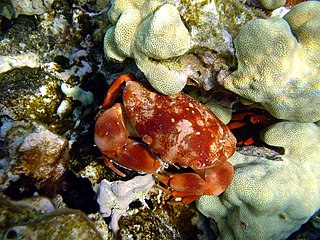
Carpilius convexus, commonly known as the marbled stone crab, is a species of crab found in the Indo-Pacific, from Hawaii to the Red Sea and South Africa. It was first described by Peter Forsskål in 1775 as "Cancer convexus", and has sometimes been treated as a variety of the larger species Carpilius maculatus. The biology of the genus Carpilius is poorly known. The coloration of Carpilius convexus is a yellow-brown or red, with patches that are mainly brown, growing up to 25 cm. Despite us knowing their size, coloration, and habitat, little else is known about their biology.
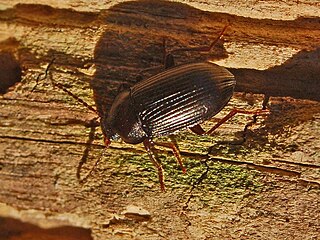
Nalassus dryadophilus is a species of darkling beetles belonging to the subfamily Tenebrioninae.
Haptoderodes is a genus of carabids in the beetle family Carabidae. There are at least two described species in Haptoderodes, found in Africa.
Xystosomus is a genus of beetles in the family Carabidae, containing the following species:
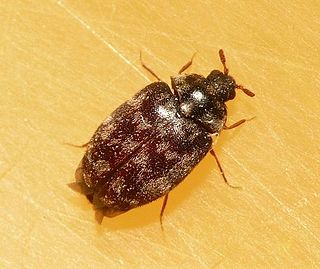
Anthrenocerus is a genus of beetles in the family Dermestidae, the skin beetles.
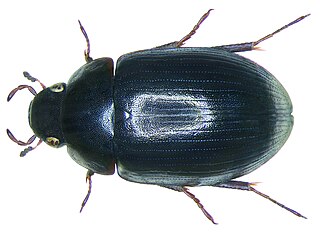
Hydrobius is a genus of hydrophilid beetles that contains nine species distributed throughout the Holarctic realm.
Anthrenocerus convexus is a species of beetle, native to Australia. It is within the genus Anthrenocerus and the family Dermestidae.
Harpalus convexus is a species of ground beetle in the subfamily Harpalinae. It was described by Faldermann in 1836.
Mecyclothorax convexus is a species of ground beetle in the subfamily Psydrinae. It was described by Liebherr in 2006.
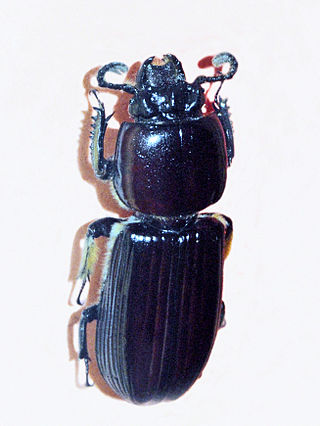
Passalus is a genus of beetles of the family Passalidae.

Nalassus is a genus of darkling beetles in the family Tenebrionidae. There are more than 70 described species in Nalassus, in the Palearctic and North America.
Mimoprosoplus convexus is a species of beetle in the family Cerambycidae, and the only species in the genus Mimoprosoplus. It was described by Stephan von Breuning in 1970.
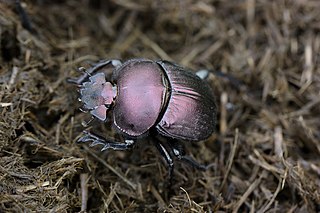
Anachalcos convexus is a species of scarab beetle in the genus Anachalcos.
Tmesisternus convexus is a species of beetle in the family Cerambycidae. It was described by Gressitt in 1984. It is known from Papua New Guinea.

Clitostethus is a genus of dusky lady beetles in the family Coccinellidae, including over 40 species, many of which were formerly placed under the genus name Nephaspis.
Haroldiataenius is a genus of aphodiine dung beetles in the family Scarabaeidae. There are about nine described species in Haroldiataenius.
Haroldiataenius convexus is a species of aphodiine dung beetle in the family Scarabaeidae. It is found in North America.
Aphotaenius is a genus of aphodiine dung beetles in the family Scarabaeidae. There are about five described species in Aphotaenius.










